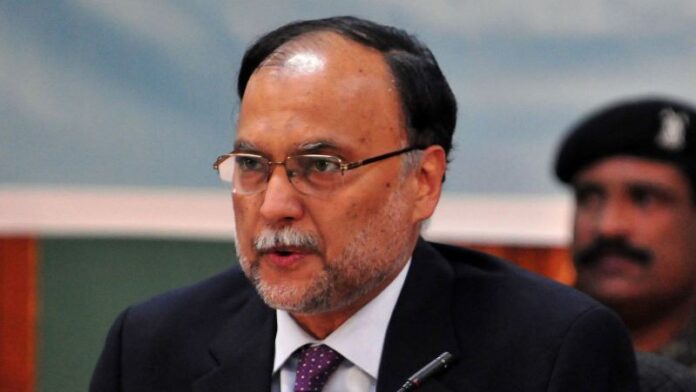CPEC will assist Pakistan in contributing to regional connectivity: Planning Minister
The Minister for Planning and Development, Ahsan Iqbal, said that China’s “Belt and Road Initiative” is in line with Pakistan’s national interests and development strategy. In an interview with Chinese media, he said that the project had improved Pakistan’s economy and citizens’ quality of life during the past ten years through CPEC. According to the Minister, the CPEC will help Pakistan improve the economic ties among the nations of Central and South Asia, transforming the area into the future center of the global economy. He also said that Pakistan would look into trade operations during the CPEC’s next phase, with a focus on business-to-business engagement with China.
BEIJING, Jan 16, (APP): Federal Minister for Planning, Development and Reform Professor Ahsan Iqbal has said that China’s ‘Belt and Road Initiative’ (BRI) is aligned with Pakistan’s development strategy and national interests.
“Not only the initiative has boosted the national economy and people’s living standards over the last decade through China-Pakistan Economic Corridor (CPEC), but also will assist Pakistan in contributing to better connectivity of economic powers in Central Asia and South Asia, making the region the future of the world economy.
“In this spirit, the Government of Pakistan will explore trade activities, with a special emphasis on B2B cooperation, play a role in connecting business schools between the two countries, and assist the business community in better understanding the Chinese market during the next stage of CPEC,” the minister said in an interview with China Economic Net.
He said CPEC was a fusion of Pakistan’s Vision 2025 and China’s BRI initiative.It brought investment in Pakistan in the sectors that were crippling the economy. As China’s all-weather strategic partner and direct beneficiary of BRI, Pakistan’s energy, infrastructure, technology, and industrial sectors have all fetched benefits since the start of CPEC.
“More than 5,000-megawatt new power generation was installed at a time when Pakistan was facing acute energy shortages. CPEC also contributes to the construction of new modern infrastructure, such as the M-5 Sukkur-Multan Motorway, the Hakla-D.I Khan Motorway, and the Gwadar East Bay Expressway.
“Similarly, CPEC has laid a new information highway between Pakistan and China via fiber optic cable, which will help improve Pakistan’s digital infrastructure”, the minister said.
The second phase of CPEC, he added, addressed the challenge of developing Pakistan into an industrial economy, through establishing special economic zones and deepening government to government cooperation.
“This year, China will celebrate the tenth anniversary of its flagship Belt and Road Initiative (BRI). Pakistan, like other participants, believes that the fundamental reason for the ‘Belt and Road’ initiative’s strong resilience and vitality is that it is being jointly built, in accordance with the historical trend of economic globalization, the demands of the modern era for the reform of the global governance system, and the strong desire of people from all countries to live better lives,” he added.
“When CPEC began, Pakistan launched Vision 2025, which declared regional connectivity as one of Pakistan’s primary drivers of growth. We will see greater regional integration after CPEC is completed,” the minister predicted. “We can create shared prosperity for over 3 billion people in this region by increasing connectivity within Central Asia, South Asia, and China.”
Finance Minister meets Chinese counterpart in Washington
Finance Minister Muhammad Aurangzeb held separate meetings with Chinese and Saudi finance …













